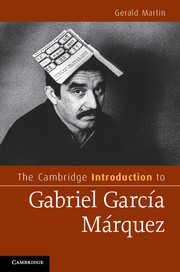Book contents
- Frontmatter
- Contents
- Introduction
- Chapter 1 The life and work in historical context
- Chapter 2 Early short stories, journalism and a first (modernist) novel, Leaf Storm (1947–1955)
- Chapter 3 The neorealist turn
- Chapter 4 One Hundred Years of Solitude (1967)
- Chapter 5 The Autumn of the Patriarch (1975)
- Chapter 6 Chronicle of a Death Foretold (1981)
- Chapter 7 Love in the Time of Cholera (1985)
- Chapter 8 More about power
- Chapter 9 More about love
- Chapter 10 Memoirs
- Conclusion
- Notes
- Further reading
- Index
Chapter 1 - The life and work in historical context
Published online by Cambridge University Press: 05 June 2012
- Frontmatter
- Contents
- Introduction
- Chapter 1 The life and work in historical context
- Chapter 2 Early short stories, journalism and a first (modernist) novel, Leaf Storm (1947–1955)
- Chapter 3 The neorealist turn
- Chapter 4 One Hundred Years of Solitude (1967)
- Chapter 5 The Autumn of the Patriarch (1975)
- Chapter 6 Chronicle of a Death Foretold (1981)
- Chapter 7 Love in the Time of Cholera (1985)
- Chapter 8 More about power
- Chapter 9 More about love
- Chapter 10 Memoirs
- Conclusion
- Notes
- Further reading
- Index
Summary
Gabriel José García Márquez is a Caribbean writer. He was born in Aracataca, a small banana plantation town close to the northern coast of tropical Colombia (‘la Costa’), on 6 March 1927. His mother, Luisa Santiaga Márquez Iguarán, was from a family which originated in the wild Guajira Indian territory to the east, across the Sierra Nevada, and which had emigrated to Aracataca after her father, Colonel Nicolás Márquez, had killed a former comrade from the War of the Thousand Days between the Liberal and Conservative parties (1899–1902). By the time of García Márquez’s birth his grandfather, a Liberal, was one of the leading figures in the town, even though the Liberals had lost the war. By contrast, his father, Gabriel Eligio García, was a telegraphist from Bolívar province, to the west, a region more associated with Afro-Colombian than Indian culture, and had been born illegitimate to a girl of fourteen who was seduced by a schoolteacher. Gabriel Eligio, perhaps surprisingly, was a Conservative. The courtship of Gabriel Eligio and Luisa Santiaga was vigorously opposed by her parents. (They had a skeleton in their own closet: they were first cousins.) They sent her away for a year, but love triumphed in the end and their daughter’s open rebellion eventually forced the colonel and his wife Tranquilina Iguarán to relent. The young couple were married in 1926 and moved to the coastal town of Riohacha, in the Guajira.
A few months later Luisa Santiaga returned to her parents’ house in Aracataca for the birth of her first child. By now her husband had tired of telegraphy and had set up as a homeopathic doctor. When the baby – known as Gabito – was less than a year old the young couple left him behind with his grandparents and moved with their second baby, Luis Enrique, to another Caribbean coastal city, Barranquilla, at the mouth of the Magdalena River. Until the age of seven Gabito saw his mother and father no more than two or three times and effectively forgot them: their place was taken by his grandfather, the colonel, and his wife Tranquilina, as well as several aunts and a collection of servants. Later his sister Margot, a sickly child, was also sent to live with him in Aracataca.
- Type
- Chapter
- Information
- The Cambridge Introduction to Gabriel García Márquez , pp. 3 - 10Publisher: Cambridge University PressPrint publication year: 2012



